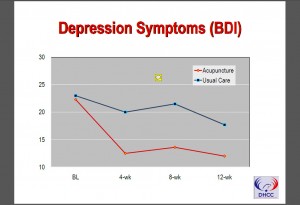Acupuncture and the Treatment of Depression
Depression is far more common than many people realize. Whether it’s mild or severe, nearly everyone experiences some form of depression at least once during their lifetime. And yet, despite how widespread it is, many individuals choose not to seek help—leading to unnecessary suffering for themselves and their loved ones.
Untreated depression isn’t just emotionally painful—it can become a life-threatening condition, much like heart disease or asthma. It’s critical to approach depression with both urgency and empathy, recognizing it as a serious health concern that demands thoughtful and compassionate care.
How Acupuncture Can Help
Acupuncture is a well-recognized and increasingly popular treatment for depression. While it can be highly effective on its own, depression often requires a collaborative approach for the best results. Successful treatment may involve a combination of:
-
Medication
-
Counseling or psychotherapy
-
Acupuncture
-
Exercise and lifestyle changes
-
Nutritional support
What matters most is whether the treatment—or the combination of treatments—is producing real, positive change. Is the patient improving? Is their quality of life getting better?
Research Backs It Up
The U.S. military conducted a study comparing acupuncture with standard treatments for both depression and post-traumatic stress disorder (PTSD). The results were compelling: acupuncture was found to be more effective than some of the conventional approaches being used at the time.
This doesn’t mean traditional therapies aren’t useful—many are. What it does show is that acupuncture deserves a strong and respected place in the broader mental health toolkit.
Understanding and Treating Depression with Acupuncture
Depression isn’t one-size-fits-all—and to treat it effectively, we must first identify the specific type or pattern of depression the patient is experiencing. Acupuncture offers a nuanced approach, helping to address both the emotional and physical symptoms unique to each individual.
Depression Takes Many Forms in Traditional Chinese Medicine
1. Emotional Stagnation
Often the first stage of depression, emotional stagnation tends to appear when someone feels stuck—professionally or personally. Symptoms may include frequent sighing or belching, changes in appetite, PMS, insomnia (especially waking between 1–3 AM), throat tightness, and increased use of substances like alcohol or drugs.
2. Seasonal Depression
This form of depression commonly surfaces around specific holidays, anniversaries, or during seasonal shifts when daylight hours decrease. It’s more prevalent than most people realize and deserves compassionate attention.
3. Emotional Stagnation Turning into Rage
When emotional blockage builds over time, it may erupt into anger or agitation. Symptoms include yelling, suspicion, side-head headaches, red eyes, and road rage-like outbursts. The best way to help someone in this state is with calmness, reassurance, and empathy—remember, it’s tough being human.
4. Emotional Stagnation with Phlegm
This pattern can manifest as physical heaviness, weight gain, fatigue, coughing up phlegm, brain fog, and a feeling of being sluggish—especially in damp or humid weather.
5. Hormonal Imbalances / Blood Deficiency / Post-Illness Recovery
Patients experiencing hormonal shifts, blood loss, or recovery from illness may show signs of emotional instability, fatigue, bloating, night sweats, back pain, missed periods, or menopause-like symptoms. These patterns are best treated with supportive, individualized care.
Acupuncture and PTSD: Backed by Research
Acupuncture’s role in treating depression has gained respect across both medical and military communities. A landmark study titled “Efficacy of Acupuncture for PTSD in Military Personnel: A Randomized Controlled Trial” was led by Charles C. Engel, MD, MPH, Colonel, Medical Corps, U.S. Army, who served as Director of the DoD Deployment Health Clinical Center at Walter Reed and Associate Professor in the Department of Psychiatry at the F. Edward Hebert School of Medicine.
The study found that acupuncture was more effective than the military’s current standard treatments for depression and PTSD—highlighting acupuncture as a vital part of any mental health toolkit.
Note: This doesn’t diminish the value of other therapies like medication or counseling. Rather, it shows that acupuncture can be an equally important option in an integrative treatment plan.
Let’s Work Together Toward Healing
If you or a loved one is dealing with depression, don’t wait to seek help. Call our answering service or use our online scheduling system to book your appointment. You can also complete your first-visit forms and enter your insurance information conveniently online.
Thank you for visiting Acupuncture Connecticut! We proudly serve Orange, Milford, West Haven, New Haven, Stratford, Bridgeport, Fairfield, and surrounding Connecticut communities. We are also proud to accept Husky Health Plans.
Reference Web Sites
1. Balanced Health Services
2. IH Real Estate
3. Infertility Acupuncture CT
4. Chinee Hawaiian Kenpo Academy
5. The Rock Garden Branford CT
6. Alliance Real Estate School
7.Connecticut Real Estate Course
8. HCT
8. Allies Dream
9. Back To Health Branford CT
10. Sports Homes
